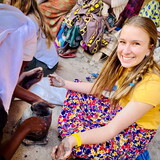Nebraska Wesleyan University junior Karlene Grinberg can already visualize what Latvia might look like.
“I see visions of family, plums, food,” said the theatre and music double major. “I have beautiful images of culture, but I also know they have experienced intense suffering and pain.”
Grinberg is one of two Nebraska Wesleyan University students who will study in Latvia later this year. They are among more than 65 NWU students who will study abroad for a semester or more this year.
The number of students studying abroad has more than doubled in recent years. Ten years ago 30 students studied abroad for a year or semester. There are several reasons for the increase, says Inger Bull, Director of International Education.
“We believe that students need to explore the world and its peoples to understand their place in that world,” said Bull. “This exploration helps them communicate across borders, contribute to the solution of complex issues and leave the world a better place than they found it.”
Bull said the variety of study abroad experiences is one reason for the increase. Students can study abroad for a semester or a year or they can participate in short-term study abroad trips led by faculty during the winter term and summer sessions. Students also have the opportunity to travel abroad for short service projects. Last year nearly 75 students participated in short-term study abroad experiences. That compares to 28 students 10 years ago.
For Grinberg, the opportunity to study in Latvia is more than just exposing herself to a new culture. It will be a chance to trace her father’s footsteps.
Grinberg’s father was born in Latvia. His mother moved him to a German refugee camp during World War II after the Soviet occupation of Latvia. They stayed there for more than five years until they were sponsored to come to the U.S. through a woman in Nebraska. Meanwhile Grinberg’s grandfather stayed behind. Her father wouldn’t see him again for another 40 years.
Karlene Grinberg was born in 1989, the year Eastern Europe overthrew communism. Her father returned to Latvia that year to find his own father.
“I admit I do not fully understand what my dad went through,” Grinberg said of her dad’s experience in a refugee camp. “I want to do this so that I understand a little more about who I am.”
Grinberg admits she doesn’t know the Latvian language but she can sing Latvian lullabies without missing a beat and can cook many Latvian foods. She recalls how as a child her dad sang to her in Latvian and they often listened to Latvian cassettes. Some of her family continues to speak Latvian and they enjoy gathering for family dinners featuring native foods.
Grinberg will study at the University of Latvia in Riga where she plans to study the country’s history, language and arts.
Traveling abroad is nothing new for Grinberg. As a former member of the Nebraska Children’s Chorus, she spent eight years singing across the world including performances at the Great Wall in China and the Notre Dame in Paris.
“I’m an explorer,” said Grinberg. “I like to take opportunities as they come.”
Bull said there are many students like Grinberg who are eager to explore life beyond Nebraska Wesleyan’s campus. In fact, it’s not unusual for students to return and decide to add another study abroad experience to their academic career.
“I think our students are one degree of separation from people who are studying abroad,” said Bull. “It seems they all know someone who is studying abroad.
“We have an atmosphere here that says to students, ‘you should do this. When will you fit it in your schedule,’” Bull added. “Our students hear it from their friends and their professors. Prospective students hear about it from admissions counselors. We’ve finally reached the critical masses that this is an important opportunity.”










